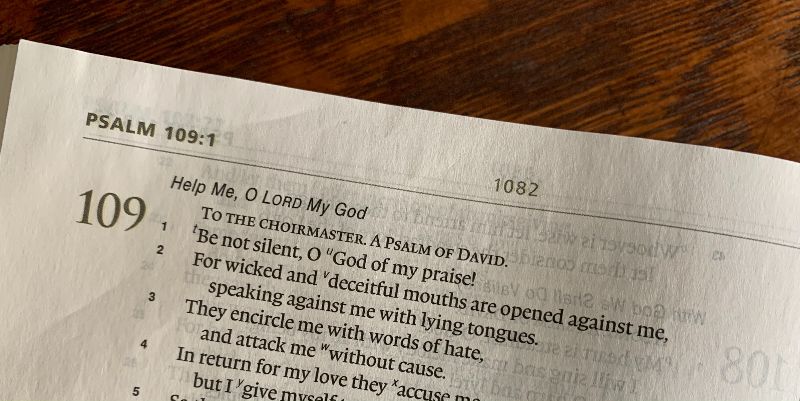Given my wandering mind and my frequent failure to focus, I find a form of praying the Psalms helpful in keeping my prayers from being hopelessly scattered or unnecessarily shallow. My list of long-term prayer concerns is intentionally short, fewer than a dozen people and their situations for which I pray day by day. Remember, I have a wandering mind and am prone to frequent failure to focus.
I use the Daily Office of the Book of Common Prayer (it can be found online at Bible Gateway and other sites). The Daily Office offers readings from the Psalter for morning and evening. I tend to use both in the morning. So, two or more Psalms per day. You go through the entire Psalter in about seven weeks. Not completely random, there seems to be some logic to the ordering of the readings, but I have never fully figured it out.
Among those for whom I pray, difficult situations have recently risen. Some of those situations have to do with serious health issues, some have to do with evil seeping through the cracks of a loved-one’s life. Another has to do with the difficult consequences of a tough decision well made. The band of friends for whom I pray, unknown to one another, is going through hard times.
Earlier this week, one of the morning Psalms was 109. It is a Psalm of David. We don’t know the exact setting; it may have to do with the raging of Saul or the rebellion of Absalom. It may have to do with something else. David is confronted by the toxic slander of his enemies, metastasized and doing great damage. The first verse caused me to pause. A long stop.
Be not silent, O God of my praise!
Death may have its way for one of my friends and the friend of another friend. The evil that has invaded the world of a couple of others will not lightly ease its grip. Each of the lives I pray for in the morning is being played out in the same dark and dreary world of pandemic and partisan politics. These are hard times.
Be not silent, O God of my praise!
David’s cry is not mediated by spiritual contemplation or an inventory of his inner life. His words are not filtered by propriety. “Hold not thy peace,” the old King James reads.
God, my friends are in tough places. They are in pain. Be not silent! Hold not thy peace!
Psalm 109:1 caused me to pause. A long stop. It was not a moment of faltering faith or deep despair, however. In that moment David, the Sweet Psalmist of Israel, prayed for me. Perhaps it was God’s Holy Spirit who first inspired David who was praying for me. Be not silent! My friends need to hear your voice. I need to hear your voice.
The better part of Psalm 109 is given over to David’s lament, his complaint about his enemies, and his desire for God’s justice. It is difficult to read it. In our therapeutic age it is all too easy to imagine the therapy that might help David. A deep breath at the very least. Long reflection to identify the real source of his anger. He needs to get over it. And maybe I need to get over my concern for my friends.
John Calvin, commenting on the Psalm from a non-therapeutic age reminds us that “David, free from all inordinate passion, breathed forth his prayers under the influence of the Holy Spirit.”
David’s cry to God to be not silent and his plea for justice are not unreasonable.
Calvin continues, “We may, indeed, have the full assurance of God being propitious towards us, yet when he delays to manifest it, and when the ungodly slander us, it must be that various doubts which keep intruding themselves upon us arise in our minds. Hence, it is not without reason that David, in order that he might withstand such attacks, places himself under the protection of that God who, according to his mercy and goodness, helps his people in their time of need. And then, indeed, it is that the loving-kindness of God appears, when it banishes from our minds the fears which we entertain of the threatenings of the world.”
The Psalm ends abruptly with David praising God:
With my mouth I will give great thanks to the LORD;
I will praise him in the midst of the throng.
Calvin comments, “By this language he intimates, that when God had apparently forsaken and abandoned him, and stood far from him, even then he was always near and ready to render him seasonable and needful help; and, assuredly, his poverty and affliction gave some reason for suspecting that he was forsaken of God, inasmuch as he then either withdrew or concealed his loving-kindness. Notwithstanding of this seeming departure, he acknowledges that, during his affliction and poverty, God never ceased to be present to render him assistance.”
Psalm 109 helped me pray one morning this week. I joined David in demanding of God that he not be silent. And I was reminded that during their affliction and poverty, God will never cease to be present and render his assistance to those for whom I pray.

Saint Andrew friends: I will be preaching, again this Sunday. “Dying to Family.” Read Luke 14:25-27 and Luke 9:57-62. In person at the church, 10:15, or livestream at the Saint Andrew YouTube channel.

